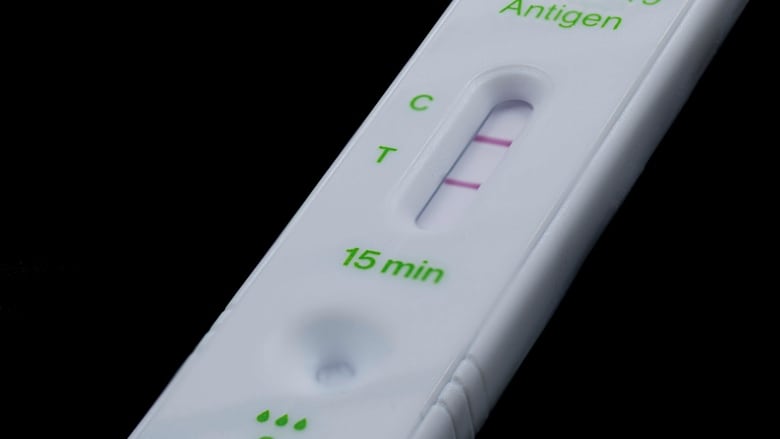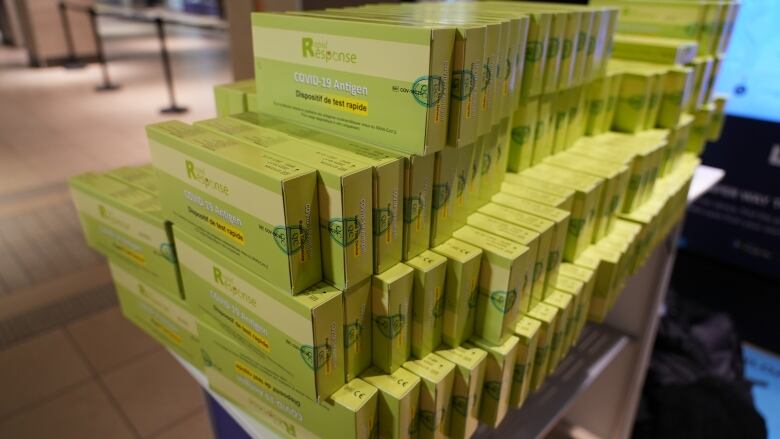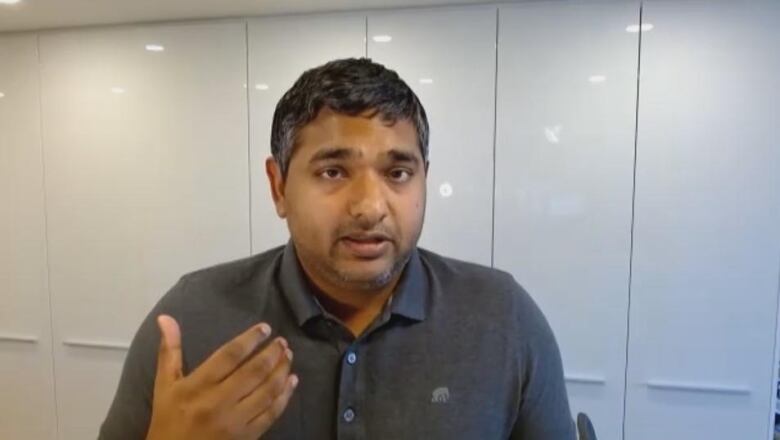What an internist is saying about COVID-19 and rapid tests ahead of the holidays
Dr. Fahad Razak says easiest way to get COVID rapid tests is from local pharmacies

If you think COVID-19 rapid tests are becoming less visible in stores and pharmacies, this Ontario internist says you're right.
Dr. Fahad Razak from St. Michael's Hospital says people went from waiting in long lines to get free tests, to being accustomed to picking one up at their local pharmacy or grocery store checkout.
As the spread of COVID becomes more apparent in parts of Ontario and Canada, Razak says asking your pharmacist for tests remainsyourbest option.
"They're not as easy [to find] as they were to get back in the day," he said.
"Unfortunately, there's not really a great repository that you can check ... Your local public health unit may have some on stock as well."
Razak spoke with Windsor Morning host Amy Dodge about test availability and the uptick in the virus ahead of the holiday season. Here's part of their conversation.
If we have a test in our cupboard from last fall, will it still give an accurate result?
Almost certainly, yes.
The government of Canada officially reviewed all of the tests that have been brought into Canada and they extended the expiry date.
Now remember, expiry dates often are something that are relatively arbitrary. And they extended the expiry date to essentially all tests that are available in Canada well into 2024.
If you have a specific question about your test, you can look at the expiry date on it and just add a year to that expiry date.
If you further want to check the Government ofCanada does have a website you can go to and specifically look up your test and brand number.
LISTEN | Ontario internist talks to Windsor Morning about COVID and rapid tests ahead of the holidays:

Do rapid tests identify all [strains] of COVID?
They absolutely do. Now, the tests in general seem to work a little bit less well than they used to, but there's a strategy to use them in a way that's still very effective. And that strategy is to use them on consecutive days and roughly 24 hours apart.
Check yourself in the morning or at lunchtime on consecutive days if you think you have symptoms or you've been exposed. Three negative tests over three days is very, very reassuring. Nothing is perfect, but it's very reassuring that it's not COVID.
And remember, the majority of what is circulating at any given time most likely is not COVID.
There's lots of other respiratory viruses circulating. But if you are going to see an elderly parent who is particularly high risk or a friend who's immunocompromised and you want to be extra careful, this is a very good mechanism.
You also mentioned that they're not as effective. Why is that?
There are the actual tests that were developed way back at the start of the pandemic, and they were tailored towards the variant and the antigen.
The antigen that the test uses they're called rapid antigen tests was tailored exactly to that variant.
So there's probably been a little bit of slippage over time and how well these tests work. But for typical use my family still uses them I have elderly parents actually in Windsor who I want to be careful when we see them, we're not exposing them.
We have young kids in school, so constantly someone is coughing in our household. So we use those tests as our mechanism of checking.
I want to reassure people maybe there's a little bit of a change, but they're still practically a good tool as part of a general strategy.

What are some of the symptoms of the [strain] going around right now?
Almost identical. We haven't seen a real meaningful change in the way that people are presenting over the course of the pandemic.
We used to say where the virus tends to have the highest concentration practically for you and I, if you develop COVID, what we'd broadly describe as respiratory symptoms seem to still be the most common way that people have symptoms.
And gastrointestinal symptoms are also very common.
Having just come off a shift in hospital last week we actually admitted quite a high number of COVID [cases], I think the highest that I've seen in over a year, which matches the wastewater signal, which is at the high point of the year. The tests which are at a high point of the year.
There were a number of people who came in with gastrointestinal symptoms. That was another way that we were seeing people present, elderly people:Days and days of diarrhea, very dehydrated, coming into hospital.
We've been hearing that the wastewater testing is showing high levels of COVID. Have you seen those results as well?
Yeah, absolutely.
You know the wastewater tests, because most people don't test themselves anymore wastewater becomes very important just to give people a sense of how much is circulating and sometimes it can be very reassuring.
So, for example, this summer was very low. The chance of being exposed if you were in a gathering was very, very low.
Unfortunately, with less than a month going in before the holidaysnow it is at a high point for a year currently.
And, you know, a lot of us say informally, you don't need just the wastewater test. How many people do you know recently who have become positive with COVID?
There's your personal experience plus the wastewater testing, probably aligning pretty strongly to tell youthere's a lot of COVID floating around right now.

Are you surprised that we're seeing a spike now?
Not at all.
I want to emphasize, as someone who works in a hospital and cares for patients who are really sick and worked every wave of the pandemic and saw those early waves where people had severe COVID pneumonia, they were dying, they were ending up in the intensive care unit, we couldn't do anything about it: This is a very different disease now than it was back then.
However, there is still an important opportunity to enhance safety now.
What can we do to adapt so this reduces its impact on our lives as much as possible? ... Will you wear a mask when you're in a crowded indoor setting? A lot of that is not there. Realistically, walking around, I don't see it. I hope over time we do adopt some of those protective strategies because to me, every infection prevented is a good thing.
If we do test positive or we think we have COVID, is it still convention that we stay away from people for a couple of days?
The recommendation in general, if you want to be conscientious there's no one to enforce this, but let's say you want to reduce exposure to people at work or at school or your family.
Generally, the rule is as long as your fever has cleared for 24 hours, where your gastrointestinal symptoms have cleared for a couple of days, that is the time where you're kind of on the downward and your symptoms are improving overall, that's generally when people say you can get back and get back out there.
Because we know the infectivity is highest in that early phase, so that's generally what we say.
And how much does the COVID immunization work to keep us clear?
It's a very effective match against what is circulating right now and the uptake in Ontario is extremely low. And this is where that preventative element comes into play.
Can it disrupt your lives? It absolutely can.
And the vaccines, to me, are like a seatbelt. We wear a seatbelt when we're in a car. You just do it and you move on with your day. You don't talk about it too much. The vaccine is like that. It's that added layer of protection. It works behind the scenes. But the uptake is very, very low.
The scary thing to me is even among people over age 80, the highest risk group, so clear that they would benefit. The estimate from earlier this month was that only 20 per cent of people over the age of 80 had received the vaccine. That's extremely low. That is such a missed opportunity.
Q&A is edited for length and clarity












_(720p).jpg)


 OFFICIAL HD MUSIC VIDEO.jpg)
.jpg)



























































































